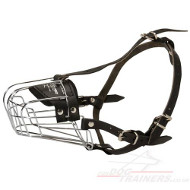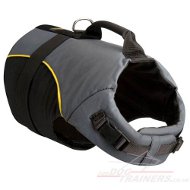Dog Vet Advice
Dog Veterinarian: What Should One Know for Dog Vet Visiting?
When one chooses a vet for a dog, one tries get to know of the dog
hospital and a dog vet as much as possible. It is important, as you
are going to entrust your friend. The health of your dog will depend
on the specialist for many years.
 Visiting a dog veterinarian is often connected with a strong stress,
and as a result, with distraction and forgetfulness. Of course, it
is impossible to keep attention and peace when your dog is bleeding
and scarcely breathing, or is unconscious. But in spite of a
stressful situation, you have to response to the questions of the
veterinarian clearly in the order he could help your dog properly.
Visiting a dog veterinarian is often connected with a strong stress,
and as a result, with distraction and forgetfulness. Of course, it
is impossible to keep attention and peace when your dog is bleeding
and scarcely breathing, or is unconscious. But in spite of a
stressful situation, you have to response to the questions of the
veterinarian clearly in the order he could help your dog properly.
It is very useful to follow and register dog health report. It will
be a real diary of dog life, and will be a very important help in a
necessity or even save the life of your dog.
Write down everything: menu, estrus, diarrhea, refusal to eat,
periods of taking anthelmintic drugs, vaccinations, habits and odd
behavior. Fill in precise dates, drugs titles, symptoms, and dog
reactions to a definite drug or food. All this information will help
to diagnose an illness and to make the recover faster.�
If you have time before taking your dog to a vet, create a list of
questions and answers. It will make the situation clearer for the
veterinarian. He will ask you the proper questions if needed, but
the problem may arise if you do not remember the date or some
unimportant details, as they may seem at the first sight, that are
very important in fact. Try to predict the questions of a dog
veterinarian and reply to them. Here the dog health report will help
you.
Here is an example of the list of questions, that a dog vet may ask
a dog owner:

- What is the difference in dog behavior that bothers you?
- When has it started? (The precise date)
- How much does the dog eat comparatively to its normal portion?
- Does a dog have a vomit or a diarrhea? How often? What is the
color? What is the kind of the contents (blood, mucus, pieces)?
- How often does a dog goes to a toilet? When has he done it the
latest time?�
- Dog feeding menu. Trade mark of dog food.
- Has the weight of your dog changed? How much?
- Does a dog have a cough, snuffle, or afraid of light?
- Are there extractions from eyes, nose, genitals? Of what
color?
- When was the latest taking of anthelmintic drugs?
- When was the latest vaccination? What kind of vaccination?
- Has the state happened to the dog before? If yes what kind of
cure have you been using?
- If dog limps, try to remember which leg hurts to show it to a
dog veterinarian. It often happens that a dog does not limp at a vet.
When a dog vet makes the diagnosis, write down all the
recommendations and advices. Do not hesitate to make notes while
conversation. You cannot trust your memory only, especially in a
stressful situation, as it work not so brilliant as normally.
If you cannot use a drug (ear drops, for example), ask a
veterinarian to show you how to do it instead of trying yourself
on the ill dog. This way you will avoid a possible harm or wrong
application.
 In a stressful situation you may forget to ask something
important, to clarify some issues. At coming back home you
remember the questions and wonder how could you forget to ask it.
A light shade of panic arises... To avoid it, ask a dog vet if it
is possible to give him a call if you will need some information
or have questions. A good dog vet will never leave you in a
trouble. If a dog vet denies to give his phone number, it is the
reason to think over and avoid visiting him again.
In a stressful situation you may forget to ask something
important, to clarify some issues. At coming back home you
remember the questions and wonder how could you forget to ask it.
A light shade of panic arises... To avoid it, ask a dog vet if it
is possible to give him a call if you will need some information
or have questions. A good dog vet will never leave you in a
trouble. If a dog vet denies to give his phone number, it is the
reason to think over and avoid visiting him again.
Write down the name and address of the dog hospital, dog
veterinarian, date of visit, titles of drugs and dosage
prescribed. If it is possible, ask the vet to give you a document
with a seal to confirm your visit. You are to be sure that the dog
veterinarian is responsible for his actions.
Do not forget to describe the state of your dog while taking a
cure. How does the state changes while taking the drugs? Be
attentive to your friend. Its life depends mostly on you. Do not
let your dog down.
These dog accessories are necessary tools for dog veterinarian visiting:




 Visiting a dog veterinarian is often connected with a strong stress,
and as a result, with distraction and forgetfulness. Of course, it
is impossible to keep attention and peace when your dog is bleeding
and scarcely breathing, or is unconscious. But in spite of a
stressful situation, you have to response to the questions of the
veterinarian clearly in the order he could help your dog properly.
Visiting a dog veterinarian is often connected with a strong stress,
and as a result, with distraction and forgetfulness. Of course, it
is impossible to keep attention and peace when your dog is bleeding
and scarcely breathing, or is unconscious. But in spite of a
stressful situation, you have to response to the questions of the
veterinarian clearly in the order he could help your dog properly. 
 In a stressful situation you may forget to ask something
important, to clarify some issues. At coming back home you
remember the questions and wonder how could you forget to ask it.
A light shade of panic arises... To avoid it, ask a dog vet if it
is possible to give him a call if you will need some information
or have questions. A good dog vet will never leave you in a
trouble. If a dog vet denies to give his phone number, it is the
reason to think over and avoid visiting him again.
In a stressful situation you may forget to ask something
important, to clarify some issues. At coming back home you
remember the questions and wonder how could you forget to ask it.
A light shade of panic arises... To avoid it, ask a dog vet if it
is possible to give him a call if you will need some information
or have questions. A good dog vet will never leave you in a
trouble. If a dog vet denies to give his phone number, it is the
reason to think over and avoid visiting him again. 


